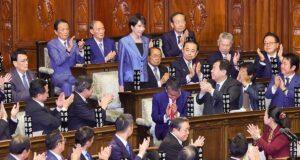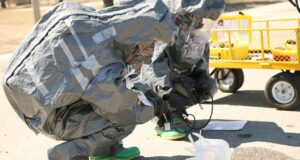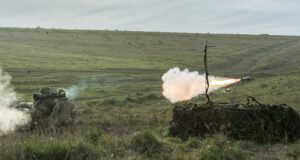February 7, 2015
By Darja Schildknecht – Associate Fellow
After the fall of the Soviet Union and the abrupt cessation of its material and political support to North Korea, the country faced increased international pressure to open up. Thus, the 1990s were partly shaped by a North Korea which was seeking greater acceptance in the international community through compliance with internationally accepted norms. In 1991, the Democratic People’s Republic of Korea (DPRK) joined the United Nations alongside the Republic of Korea, and signed the North-South Joint Declaration on the Denuclearisation of the Korean Peninsula. Two years later, North Korea completed the safeguards agreement with the International Atomic Energy Agency (IAEA), which is part of the nuclear Nonproliferation Treaty (NPT) the country signed in 1985.
Being pushed into a corner by international hegemonism led by the United States, North Korea’s leadership decided to go into an offensive posture, refusing to comply with the terms of the nuclear agreements. In 1993, North Korea threatened to withdraw from the NPT, almost simultaneously to the IAEA’s announcement that the DPRK was not adhering to the safeguard agreement and thus declaring that it could not be guaranteed that the country’s nuclear material was only being used for peaceful purposes. The situation was mitigated, after an 18-month period, with the signing of the Agreed Framework between the United States and North Korea in 1994. The framework demanded that the DPRK would freeze its existing nuclear reactors, agree to enhanced IAEA safeguards, and that the country would remain a party to the NPT. In exchange, the United States agreed to establish and organise the Korean Peninsula Energy Development Organisation (KEDO) for the implementation of the framework, to facilitate light-water reactors in North Korea and to supply the country with heavy-fuel oil for compensation purposes until the reactor was completed.
The revelation in 2002 of the DPRK’s nuclear weapons programme based on highly enriched uranium, and its withdrawal from the NPT in 2003, fundamentally changed the situation. North Korea raised threats to the United States and South Korea, conducting their first nuclear test in 2006, followed by a second nuclear test in 2009. The situation continued to deteriorate with the change of leadership in North Korea in 2011 and the DPRK’s claim that it was in possession of missiles capable of reaching the US mainland. After a failed launch in early 2012, the DPRK succeeded to launch a satellite in December 2012, proving its threat to be serious. A third nuclear test was executed in 2013, again in violation of UN resolutions and international agreements on nonproliferation.
Given this rough overview of the situation in North Korea, the big question remains how the international community should react to a country that continues to pose a threat to international peace and security.
The international arena and norm enforcement
190 parties have joined and ratified the NPT of 1968, including the five nuclear weapon states.[1] According to relevant IR scholars’ theory on norm cycles, the prevention of the spread of nuclear weapons and weapons technology as well as the peaceful use of nuclear energy can be accounted as an internalised norm in the international community.
However, the DPRK seems not to be willing to comply with this norm and the internationalism[2] established – a situation which is prompted by relatively ineffective norm enforcement of the UN Security Council as the main actor on the international arena. The UN Security Council has issued several resolutions[3] concerning the situation in the DPRK. Initially, the resolutions simply condemned the threats of North Korea, and urged the country to comply with international norms. The first UN Security Council resolution to include sanctions was adopted only in 2006, after the first nuclear test. Resolution 1695 (2006) covered an embargo on military and technological materials and luxury goods as well as financial sanctions.
After the sanctions were imposed, the DPRK agreed to resume the Six-Party talks with Russia, the US, China, Japan and South Korea. In 2009, the Security Council expanded the sanctions, to covering all arms and related material, as well as financial transactions, technical training, advice, services or assistance related to the provision, manufacture, maintenance or use of such arms or material. In response to the nuclear test in 2013, another resolution 2094 (2013) was issued, imposing additional sanctions against the DPRK. Yet, the DPRK is in non-compliance with the Security Council resolutions and with the sanctions imposed, decreasing the output legitimacy of the Security Council to an immense degree.
It is crucial to take into account a national perspective in order to understand the conflict. Not surprisingly, the main target of North Korea’s aggression is the United States, persisting in a worldview related to Cold War rhetorics and thus, setting the scene for a realist picture where no actor above the state is acknowledged and international norms are disregarded. For example, in 2002 North Korea stated in a letter to the IAEA that its nuclear programme and facilities are a matter between them and the United States, relying on historical negotiations between the US and the DPRK. Since 9/11 the US has increased its efforts to engage with North Korea, seeing the regime as an imminent threat to the country’s peace and security. However, the US attempt to stop the DPRK are based on a friend-enemy ideology coined by the Bush administration, which involves responding with the same tactic and giving ground for the DPRK’s way of reasoning. As such, President Bush characterised North Korea as a component of an “axis of evil”, arming to threaten the peace of the world. The Obama administration slightly departed from this black and white picture, focusing more on alliance coordination. However, the DPRK’s rocket launch in 2012, the nuclear test in 2013 and the recent cyber attacks on Sony, allegedly conducted by the DPRK, provoked the US to fall back into the same approach used by the Bush administration.
The way forward
The problem of nuclear proliferation poses a threat to international peace and security and is therefore global in its nature. Such a global problem necessarily needs an effective multilateral response. UN Security Council resolution 1887 (2009) called for accelerated efforts towards total nuclear disarmament. Yet, exemplified by the DPRK, the current nonproliferation regime has failed to avert the risk of the spread of nuclear weapons. Hence, the way forward is to establish a normative and legal framework on the international level, with effective enforcement measures.
The NPT, being the core element of the legal framework, needs to be updated and gaps filled, particularly addressing proliferation by non-state actors and enforcement gaps. To establish such a legal framework, the normative component plays a crucial role. Most importantly, the friend-enemy ideology applied by both North Korea and the US needs to be abandoned. The US, as major accepted player in the international arena, would need to give more authority and responsibility to higher institutions such as the UN and/or global agreements, refraining from an unilateral engagement that is harmful for the norm perception of internationalism.
To conclude, one needs to acknowledge that the DPRK’s ignorance of international norms such as nonproliferation does not only pose a risk to international peace and security, but also a threat to the concept of internationalism. In today’s age of globalisation and interdependence, it is of utmost importance to establish international norms that are acknowledged and respected by states, bringing the world one step closer to international peace and security.
[1] Under the terms of the NPT there are five states considered to be nuclear-weapon states: Russia, China, the US, France and the United Kingdom. North Korea, Pakistan and India successfully detonated nuclear weapons, but do not, however, count as nuclear-weapon states.
[2] Internationalism refers in this context to the idea of greater political cooperation between nations, therefore, placing the mutual interests of nations above individual needs.
[3] The three main tools used by the UN Security Council are Resolutions, Presidential Statements and Press Statements. Resolutions, hereby, are with binding content and therefore the most powerful instrument to use.
 Human Security Centre Human Rights and International Security Research
Human Security Centre Human Rights and International Security Research




